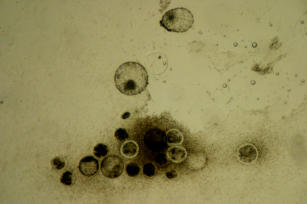Alternatives for the production of genetically modified embryos in ruminants
Alternatives for the production of genetically modified embryos in ruminants

Photo: OKUBO FILHO, Alcides
The project was conducted in order to identify and evaluate alternatives to produce genetically modified embryos and, subsequently, genetically modified ruminant animals, by identifying methods or procedures that enable the production of ruminant transgenic embryos in a more efficient way, reducing time and costs. Such procedures, associated with the insertion of genes of interest, may allow the generation of genetically modified animals capable of producing recombinant proteins important for animal and human health as well as the generation of animal with enhanced efficiency in food production. Among the procedures evaluated, it was found that microinjection in oocytes of lentiviral vectors carrying the green fluorescent protein (GFP) gene resulted in pregnancy and birth rates similar to the reported for in vitro-fertilized embryos. The use of crotamine for transfection was apparently viable and safe for embryos, with no detectable toxicity. Complex multilayer carbon nanotubes associated with GFP gene were able to transfect in vitro-fertilized zygotes. In conclusion, different methods can be used to generate genetically modified embryos of ruminants; however, more studies are needed to confirm efficiency in producing live animals. The project had the partnership of the following institutions: Embrapa Dairy Cattle, Embrapa Cerrados, Embrapa Genetic Resources and Biotechnology and UECE (State University of Ceará), and collaboration of Universidad de Concepcion, Chile.
Ecosystem: Extreme South, Atlantic Forest, Caatinga Region and Mixed forests, Cerrados Region, Pinheirais Region
Status: Completed Start date: Fri Apr 01 00:00:00 GMT-03:00 2011 Conclusion date: Mon Mar 31 00:00:00 GMT-03:00 2014
Head Unit: Embrapa Dairy Cattle
Project leader: Luiz Sergio de Almeida Camargo
Contact: luiz.camargo@embrapa.br
Keywords: Biofábricas, bovinos, caprinos, embriões, transgenia animal
